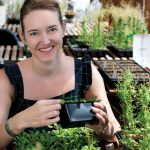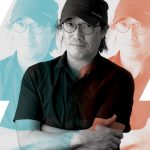Over the summer, the Salk Institute hired two new assistant professors in the fields of cancer biology and biophysics, respectively. Daniel Hollern and Pallav Kosuri will bring fresh perspectives to advance an understanding of, and find new treatments for, breast cancer and heart disease.
“We are elated to bring on two highly accomplished early-career scientists,” says Salk President Rusty Gage. “Daniel and Pallav represent the bright future of the Salk Institute, and we are excited to see what innovations and collaborations stem from their research endeavors here at Salk.”
Assistant Professor Pallav Kosuri joins Salk from Harvard University, where he was a postdoctoral fellow in the lab of Xiaowei Zhuang. At Salk, he will join the faculty of the Integrative Biology Laboratory. His work aims to better understand the physics of biological machines—from muscles contracting, to enzymes reading and editing DNA. Specifically, he is developing technologies to visualize and measure the movements of single molecules and map their organization in tissues, in order to create an integrated theory of how mechanical movement gives rise to biological function. He will apply this knowledge to examine heart disease in order to better understand why the heart experiences mechanical failure and to point the way to innovative new treatments.
Originally from Sweden, Kosuri completed his PhD in biochemistry and molecular biophysics at Columbia University. He currently holds two patents for his technologies, along with numerous accolades including the Titus M. Coan Prize for Excellence in Basic Research, the Columbia University distinction award for doctoral defense and a Fulbright Scholarship.
Assistant Professor Daniel Hollern comes to Salk from the University of North Carolina at Chapel Hill, where he was a postdoctoral fellow in the lab of Charles Perou. Hollern joins Salk’s NOMIS Center for Immunobiology and Microbial Pathogenesis as well as its renowned NCI-designated Cancer Center to pursue research that can improve the treatment of cancer patients. In particular, his lab will focus on triple-negative breast cancer (one of the five deadly cancers being researched in Salk’s Conquering Cancer Initiative), where management of advanced disease is very challenging. Hollern takes a multi-disciplinary approach to investigate responses to cancer therapies, immune cell dynamics and the mechanisms controlling tumor growth. In order to improve treatment strategies for cancer patients, he will leverage functional genomics and experimental biology to study the anti-tumor immune response.
Hollern earned his PhD in cell and molecular biology from Michigan State University and holds numerous awards including the Joseph S. Pagano Award, consecutive NIH Ruth L. Kirschstein National Research Service Awards (NRSA) and the Aitch Foundation Award.



























































